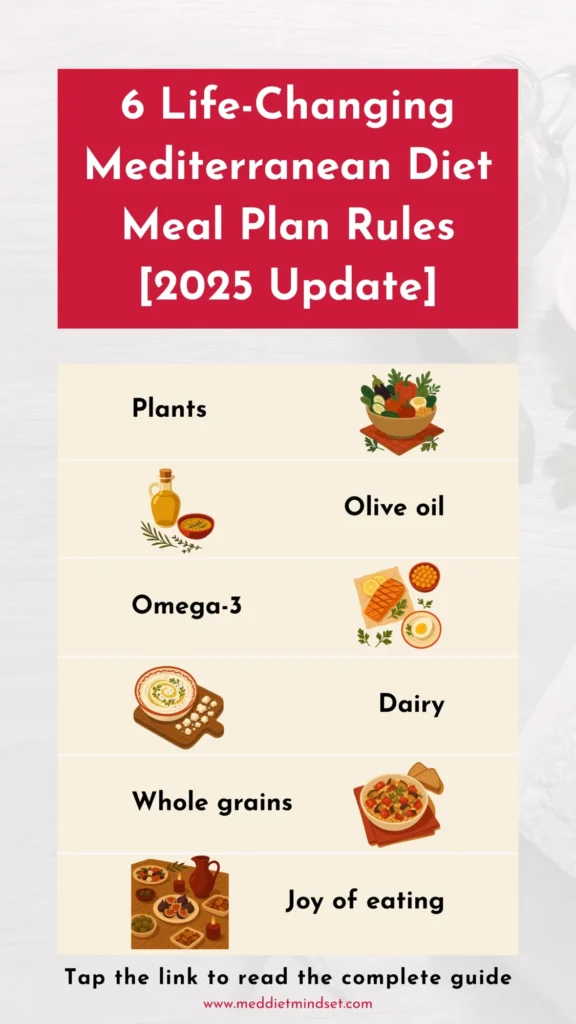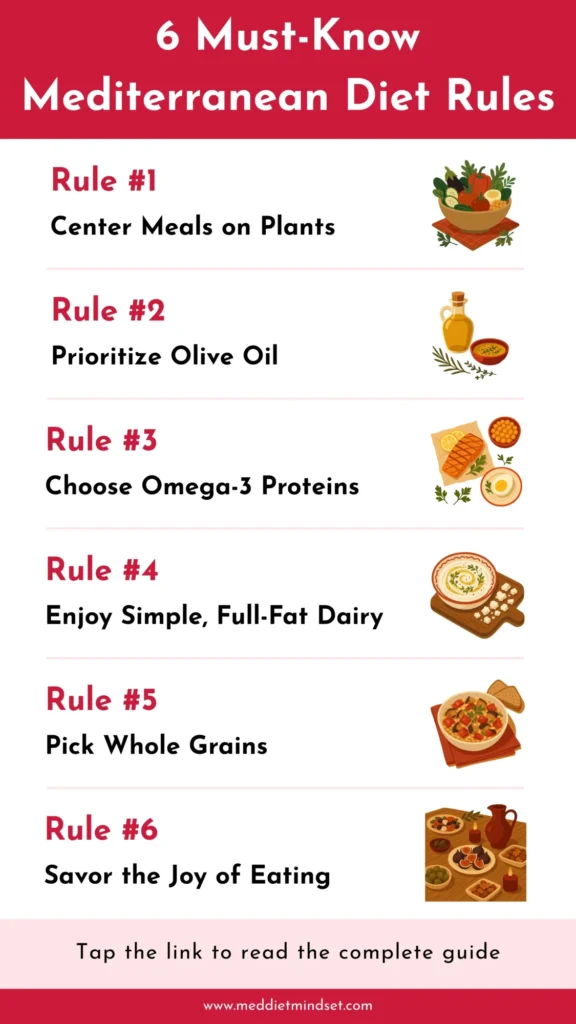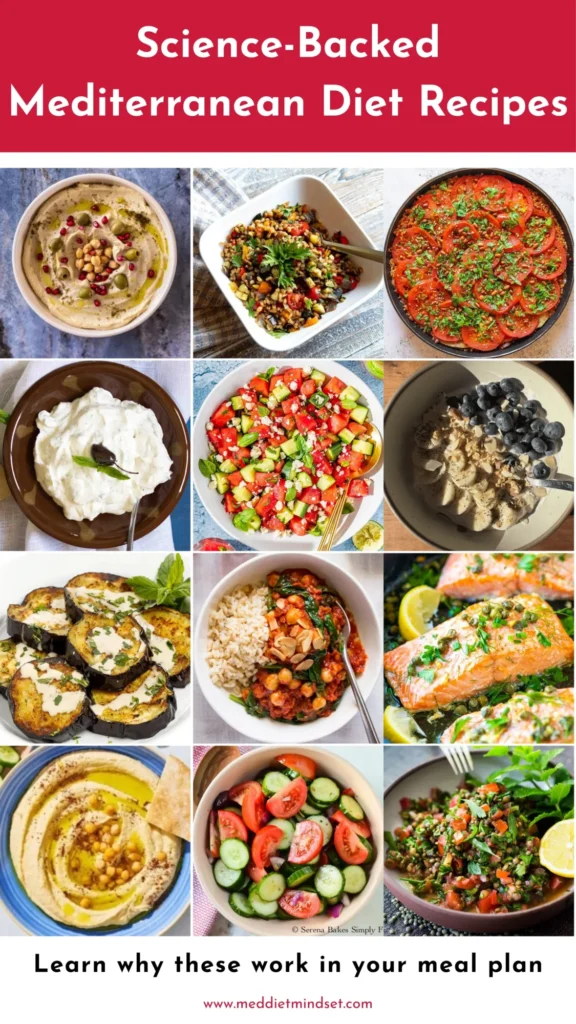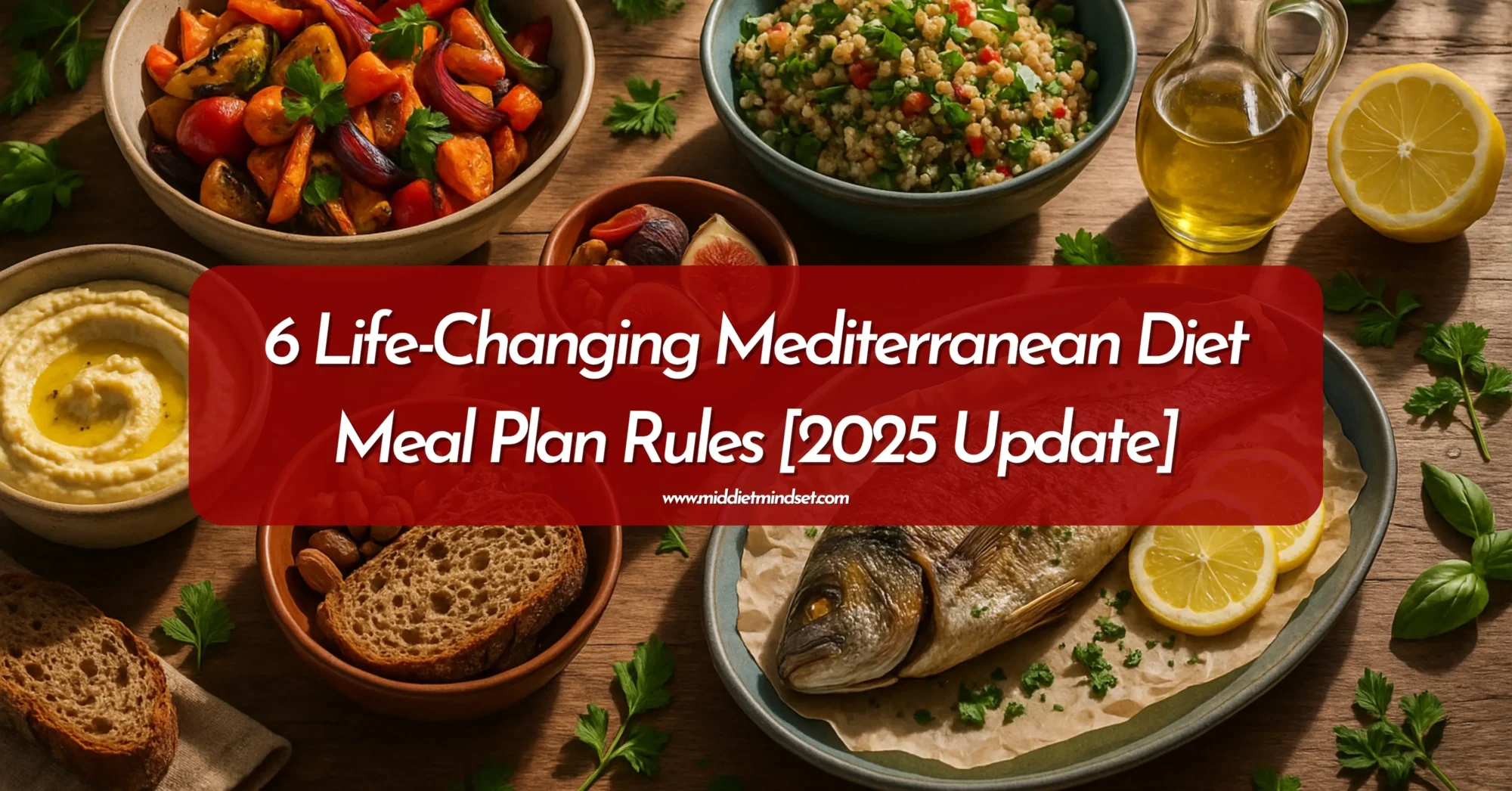Table of Contents
ToggleMost people have tried a meal plan—even a Mediterranean diet meal plan—that was too strict, too boring, or too hard to follow in real life. Maybe you did well for a week, only to quit because the food was bland, the prep was overwhelming, or you felt deprived.
That’s exactly what one of my clients told me: “This is the first time a meal plan didn’t feel like punishment.” It’s a moment that stuck with me. Because when we shifted to a Mediterranean diet meal plan, everything changed. Meals became enjoyable, flexible, and sustainable.
Unlike fad diets, a Mediterranean diet meal plan isn’t about cutting out food groups or obsessively tracking calories. Instead, it’s a balanced approach rooted in whole foods, culture, and the joy of eating. It’s supported by decades of research showing benefits for heart health, weight management, and chronic disease prevention 1.
In this guide, I’ll share 6 smart, doable rules that make planning Mediterranean meals realistic and even fun. Whether you’re new to this lifestyle or want to refine your routine, these rules will help you build a Mediterranean diet meal plan that works for you.
Ready to fall in love with food again? Let’s dive in.
Rule #1: Build Every Mediterranean Diet Meal Plan Around Plants
Why Plants Should Be the Foundation
If there’s one thing every Mediterranean diet meal plan has in common, it’s plants—lots of them. Vegetables, fruits, legumes, herbs, and nuts take center stage. They provide the fiber that supports gut health, antioxidants that reduce inflammation, and a variety of micronutrients essential for metabolic balance.
Scientific research consistently shows that plant-heavy diets reduce the risk of chronic diseases, including cardiovascular disease, diabetes, and even some cancers 1. They also support a healthier weight by increasing satiety and reducing calorie density 1,2.
Beyond nutrition, plants bring color, texture, and variety to your meals. They’re the key to making your Mediterranean diet meal plan feel vibrant and satisfying.
Mediterranean Diet Recipes That Make Veggies Shine
One of the best ways to get started is to have a few go-to Mediterranean diet recipes that put vegetables in the spotlight:
Lentil tabbouleh with parsley and tomatoes — inspired by Chef Sylvia Fountaine
Grilled eggplant with a creamy tahini sauce — inspired by Liz Della Croce
Tomato-cucumber-olive salad with fresh herbs — inspired by Serena
These Mediterranean diet recipes are flexible, affordable, and easy to batch prep.
What the Research Says
A review found that adherence to a Mediterranean dietary pattern, rich in plant foods, is associated with a significant reduction in overall mortality, cardiovascular disease incidence, and cancer risk. This effect is largely credited to the high intake of fiber, polyphenols, and unsaturated fats found in plant-based foods.
Fiber plays multiple roles in supporting health. Soluble fiber forms a gel in the digestive tract that slows the absorption of sugars, helping stabilize blood glucose levels. It also binds cholesterol, reducing its absorption and promoting healthier lipid profiles. Insoluble fiber, on the other hand, adds bulk to stool and supports regular bowel movements, lowering the risk of colorectal issues. Additionally, fibers serve as food for beneficial gut bacteria. As these bacteria ferment fiber, they produce short-chain fatty acids like butyrate, which reduce inflammation in the gut, strengthen the intestinal barrier, and help regulate immune function throughout the body 3,4.
Polyphenols, found abundantly in fruits, vegetables, herbs, and legumes, offer potent antioxidant activity by neutralizing harmful free radicals. But their benefits go beyond that. Polyphenols influence cellular signaling pathways, helping to reduce chronic inflammation, improve blood vessel function, and modulate gene expression linked to disease risk. For example, they can help keep blood vessels flexible and lower blood pressure by promoting nitric oxide production, supporting overall cardiovascular health 5.
Unsaturated fats, especially those from olive oil, nuts, and seeds, contribute to a healthier lipid profile by lowering LDL (bad) cholesterol while maintaining or even boosting HDL (good) cholesterol. Replacing saturated fats with these unsaturated fats can reduce cardiovascular risk. Additionally, they have anti-inflammatory properties, in part by influencing the types of signaling molecules produced in the body, steering them toward less inflammatory pathways 6.
Together, these elements work in harmony in a Mediterranean diet meal plan to lower inflammation, improve blood sugar regulation, support healthy cholesterol levels, and reduce the risk of chronic diseases. This synergy is a key reason the Mediterranean way of eating is so effective and sustainable.
Practical Tip
When building your Mediterranean diet meal plan, aim to fill half your plate with vegetables at each meal. Don’t overthink it—raw, cooked, grilled, or even fermented all count. Planning your meals around plants makes the rest of the process much easier.
Takeaway
A plant-centered Mediterranean diet meal plan delivers fiber, polyphenols, and healthy fats that work synergistically to reduce inflammation, support gut health, and lower chronic disease risk.

Rule #2: Make Olive Oil the Cornerstone of Your Mediterranean Diet Meal Plan
The Power of Extra Virgin Olive Oil
Olive oil isn’t just a cooking fat—it’s a signature element of the Mediterranean diet meal plan. It offers a unique blend of monounsaturated fats and polyphenolic compounds with proven health benefits.
Studies show that high consumption of extra virgin olive oil is associated with reduced inflammation, improved lipid profiles, and lower risk of cardiovascular events 7. It’s also linked to better weight management due to its satiating properties and role in replacing less healthy fats 8.
Olive oil is what ties many Mediterranean diet recipes together, adding flavor, moisture, and that unmistakable richness.
Mediterranean Diet Recipes That Feature It
You don’t need fancy techniques to use olive oil well. Try these simple Mediterranean diet recipes:
Classic Greek salad with olive oil-lemon dressing — inspired by Suzy Karadsheh
Creamy hummus topped with a generous drizzle of EVOO — inspired by Suzy Karadsheh
Roasted seasonal vegetables with a garlic oil glaze — inspired by Suzy Karadsheh
These Mediterranean diet recipes make healthy eating delicious.
What the Research Says
The landmark PREDIMED study found that participants who followed a Mediterranean diet meal plan supplemented with extra virgin olive oil had a significantly lower incidence of major cardiovascular events compared to those on a low-fat diet. This benefit is largely attributed to the overall dietary pattern rich in plant foods, healthy fats, and moderate wine consumption.
Extra virgin olive oil, a central ingredient, is especially important because it’s packed with monounsaturated fats and polyphenols. These compounds help reduce oxidative stress, lower inflammation, improve cholesterol levels, and enhance endothelial function—the lining of blood vessels—making them more elastic and better at regulating blood pressure. Together, these effects help protect against heart attacks and strokes 10.
Practical Tip
Use extra virgin olive oil generously but thoughtfully. For maximum health benefits, drizzle it over cooked dishes after preparation to preserve its antioxidants. Store it in a cool, dark place to prevent oxidation.
Takeaway
Making olive oil central to your Mediterranean diet meal plan provides monounsaturated fats and polyphenols that reduce inflammation, improve cholesterol, and protect heart health.
Rule #3: Include Omega-3-Rich Proteins in Your Mediterranean Diet Meal Plan
Prioritize Fish, Legumes, and Eggs
Many meal plans over-rely on red and processed meats, which can increase inflammation and disease risk. A Mediterranean diet meal plan emphasizes proteins that support health—especially omega-3-rich fish, legumes, and eggs.
Omega-3 fatty acids are crucial for reducing systemic inflammation, improving cardiovascular health, and supporting cognitive function 11, 12. Legumes and eggs offer affordable, nutrient-dense protein sources with minimal saturated fat.
Balancing animal and plant proteins is a hallmark of Mediterranean eating.
Mediterranean Diet Recipes with Protein Power
Protein doesn’t have to be complicated or expensive. Here are some Mediterranean diet recipes:
Baked salmon with dill and lemon — inspired by Adam and Joanne Gallagher
Chickpea and spinach stew with spices — inspired by Ania rustic
Boiled egg and avocado toast on whole grain bread — inspired by Adam and Joanne Gallagher
These Mediterranean diet recipes can be prepped ahead and adapted to personal taste.
What the Research Says
Practical Tip
For your Mediterranean diet meal plan, aim for at least two fish meals weekly and three or more plant-based protein dishes. Keep canned salmon, sardines, or dried legumes on hand to make this easy and budget-friendly.
Takeaway
Including omega-3-rich proteins in your Mediterranean diet meal plan lowers inflammation, supports heart health, and improves metabolic outcomes.
Rule #4: Keep Dairy Simple, Full-Fat, and Optional in Your Mediterranean Diet Meal Plan
Think Greek Yogurt, Labneh, and Feta
Dairy can be confusing in many diets—low-fat, no-fat, or avoid altogether? The Mediterranean diet meal plan takes a simpler approach: choose traditional, full-fat, minimally processed options in moderation.
Fermented dairy products like Greek yogurt, labneh, and feta offer protein, calcium, and probiotics without unnecessary sugars or additives. They’re flavorful, filling, and easy to use in countless Mediterranean diet recipes.
Mediterranean Diet Recipes with Smart Dairy
Some classic Mediterranean diet recipes for including dairy mindfully:
Yogurt and berry breakfast bowls — inspired by StyleBlueprint
Feta and watermelon salad for a summer meal — inspired by Suzy Karadsheh
Labneh dip with mint, garlic, and olive oil — inspired by Margarita
These recipes show that dairy doesn’t need to be the main event—it’s an accent that elevates meals.
What the Research Says
Evidence suggests that fermented dairy products support gut microbiome diversity and have favorable effects on metabolic health markers, including insulin sensitivity and weight regulation. According to a comprehensive expert review, fermented dairy foods like yogurt and kefir deliver live beneficial bacteria and fermentation-derived compounds that help modulate the gut microbiota. This modulation promotes a healthier balance of gut bacteria, which in turn supports metabolic functions.
The fermentation process also produces bioactive peptides and metabolites that may improve insulin sensitivity and reduce systemic inflammation.
Epidemiological studies have consistently linked the regular consumption of fermented dairy products with lower body mass index (BMI), reduced risk of type 2 diabetes, and improved markers of metabolic syndrome.
Practical Tip
Don’t overthink dairy. If you like it, enjoy 1–2 servings daily of full-fat, unsweetened, preferably fermented options as part of your Mediterranean diet meal plan. If you don’t, skip it—this plan is flexible.
Takeaway
Choosing fermented, full-fat dairy in your Mediterranean diet meal plan supports gut microbiome diversity and improves metabolic health.

Rule #5: Prioritize Whole Grains in Your Mediterranean Diet Meal Plan
Why Whole Grains Are a Must
Whole grains are another essential building block of a successful Mediterranean diet meal plan. They deliver sustained energy, stabilize blood sugar, and support digestive health thanks to their fiber and nutrient content.
Unlike refined grains, whole grains retain the bran and germ, preserving vitamins, minerals, and phytonutrients. This helps regulate appetite and reduce overeating 16.
Mediterranean Diet Recipes for Whole Grain Success
Integrating whole grains can be simple and tasty with these Mediterranean diet recipes:
Bulgur Pilaf with Freekeh and Chargrilled Zucchini — inspired by Talia
Farro Salad with Roasted Vegetables — inspired by Deborah Mele
The Creamiest Hummus & Pita Bread — inspired by Ayushi Gupta-Mehra
These Mediterranean diet recipes provide filling, balanced meals that don’t require hours in the kitchen.
What the Research Says
A large meta-analysis found that higher whole grain intake is linked to lower risk of type 2 diabetes, obesity, and heart disease. This study combined results from over 50 research papers and showed that people who eat more whole grains have better blood sugar control, healthier weight, and stronger heart health. Whole grains are high in fiber, which helps you feel full longer, keeps blood sugar steady, supports gut health, and lowers inflammation in the body.
Fiber-rich grains help keep you full longer by slowing down digestion. This slower process means your body absorbs sugars more gradually, which helps maintain steady blood sugar levels instead of causing big spikes. The fiber adds bulk to meals, making you feel satisfied and less likely to overeat. Eating more fiber-rich grains also supports healthy insulin response, making it easier for your body to use blood sugar properly over time 18.
Practical Tip
Watch for marketing tricks. “Brown bread” isn’t always whole grain. When planning your Mediterranean diet meal plan, check labels for 100% whole grain, whole wheat, or traditional grains like bulgur, farro, and barley.
Takeaway
Prioritizing whole grains in your Mediterranean diet meal plan improves blood sugar control, supports gut health, and reduces chronic disease risk.
Rule #6: Don’t Forget the Joy of Eating in Your Mediterranean Diet Meal Plan
Food Is Culture, Connection, and Celebration
This is the rule most meal plans miss!
The Mediterranean diet meal plan isn’t just about nutrients—it’s about enjoying food. Meals are a time for connection, mindfulness, and cultural traditions.
Eating slowly, sharing dishes, and savoring each bite aren’t just traditions—they’re smart ways to feel truly satisfied with our meals. When we take time to enjoy food, we give our bodies a chance to recognize fullness cues, which helps prevent overeating.
Sharing dishes encourages variety and balance on the plate, while slowing down the pace of a meal reduces the rush and anxiety that can come with rigid “diet rules.” Together, these habits help us develop a healthier, more relaxed relationship with food, making balanced choices feel easier and more sustainable over time 19.
Mediterranean Diet Recipes with Joy Built In
Embrace the spirit of Mediterranean dining with these Mediterranean diet recipes:
Herb-stuffed grape leaves to share with friends
A small glass of red wine enjoyed over conversation
Fresh figs and walnuts for dessert
These Mediterranean diet recipes remind us that food is about more than fuel.
What the Research Says
Research indicates that enjoyment and mindful eating practices, such as slowing down, savoring flavors, and paying attention to hunger and fullness cues, can improve dietary adherence and overall diet quality.
A systematic review of 22 studies found that these practices are consistently associated with healthier dietary patterns, greater satisfaction with meals, and reduced consumption of energy-dense, nutrient-poor foods. Mechanistically, mindful eating enhances self-regulation, encourages more intentional food choices, and fosters sustained healthy eating behaviors.
These principles align closely with the Mediterranean dietary pattern, where shared meals, appreciation of flavors, and a relaxed eating pace are central cultural features that support long-term health outcomes.
Practical Tip
Don’t aim for perfection. Instead, aim for presence. A successful Mediterranean diet meal plan includes flexibility, laughter, and shared meals.
Takeaway
Embracing joy and mindful eating in your Mediterranean diet meal plan enhances satisfaction, reduces stress, and improves long-term dietary adherence.

Final Thoughts
A Mediterranean diet meal plan isn’t just another trend—it’s a time-tested, sustainable way of eating that celebrates real food, balance, and joy. By focusing on plants, embracing healthy fats like olive oil, choosing omega-3-rich proteins, enjoying simple fermented dairy, prioritizing whole grains, and remembering the pleasure of shared meals, you can make healthy eating both realistic and deeply satisfying.
Looking to go even further? Explore Mediterranean Diet Health Principles: The Complete Evidence-Based Guide to master the foundations, or plan ahead with Meal Prep Mediterranean Diet Snacks for Travel and Vacation for healthy snacking on the go.
You don’t have to overhaul your entire routine overnight. Start small by picking one or two of these rules this week. Experiment with new Mediterranean diet recipes that you’ll actually look forward to eating, and see how these simple shifts can transform not just your meals, but your entire mindset about food.
F.A.Q.
In a typical Mediterranean diet meal plan, olive oil is the main fat source—but moderation still matters. Studies often recommend around 2–4 tablespoons per day. This amount gives you the health benefits of monounsaturated fats and polyphenols without adding unnecessary calories that could derail your goals. A smart strategy is to use olive oil for dressings, drizzling over cooked vegetables, or finishing dishes—rather than deep-frying or over-pouring. In your Mediterranean diet recipes, focus on quality extra virgin olive oil for maximum flavor and nutrients. Remember, olive oil isn’t just about fat—it’s a flavorful, anti-inflammatory staple that makes your meals satisfying, but it’s best used thoughtfully to keep your overall diet balanced and heart-healthy.
Absolutely! While fish is a traditional feature of the Mediterranean diet meal plan for its omega-3 content, there are plenty of plant-based and vegetarian-friendly ways to follow it. Legumes like lentils, chickpeas, and beans, as well as nuts and seeds, offer excellent protein and healthy fats. Flaxseeds, chia seeds, and walnuts are plant-based sources of omega-3s you can include in your Mediterranean diet recipes. Eggs and dairy like Greek yogurt or labneh can also help round out protein needs. The key is variety and balance. Even without fish, you can build a nutritious, satisfying Mediterranean-style meal plan that supports heart health, reduces inflammation, and aligns with your dietary preferences.
In a Mediterranean diet meal plan, true whole grains retain all parts of the grain kernel—the bran, germ, and endosperm—preserving fiber, vitamins, and minerals. Examples include bulgur, farro, barley, whole wheat, brown rice, and oats. Watch out for marketing tricks like “brown bread” that isn’t truly whole grain. Always check labels for terms like “100% whole wheat” or “whole grain” as the first ingredient. Including these in your Mediterranean diet recipes adds sustained energy, supports blood sugar control, and promotes digestive health. Experiment with simple swaps: use whole wheat pita with hummus, make bulgur pilaf with herbs, or try farro tossed with roasted vegetables. These choices make your meal plan healthier and more authentic.

Nour is a registered dietitian, nutrition researcher, and founder of MedDietMindset. With a passion for evidence-based nutrition, she specializes in Mediterranean diet strategies, PCOS management, and sustainable weight loss. Nour is dedicated to transforming complex scientific research into clear, actionable guidance to support healthier, long-lasting lifestyle changes. Through her blog, she empowers readers to build habits that prioritize well-being, balance, and vitality.

